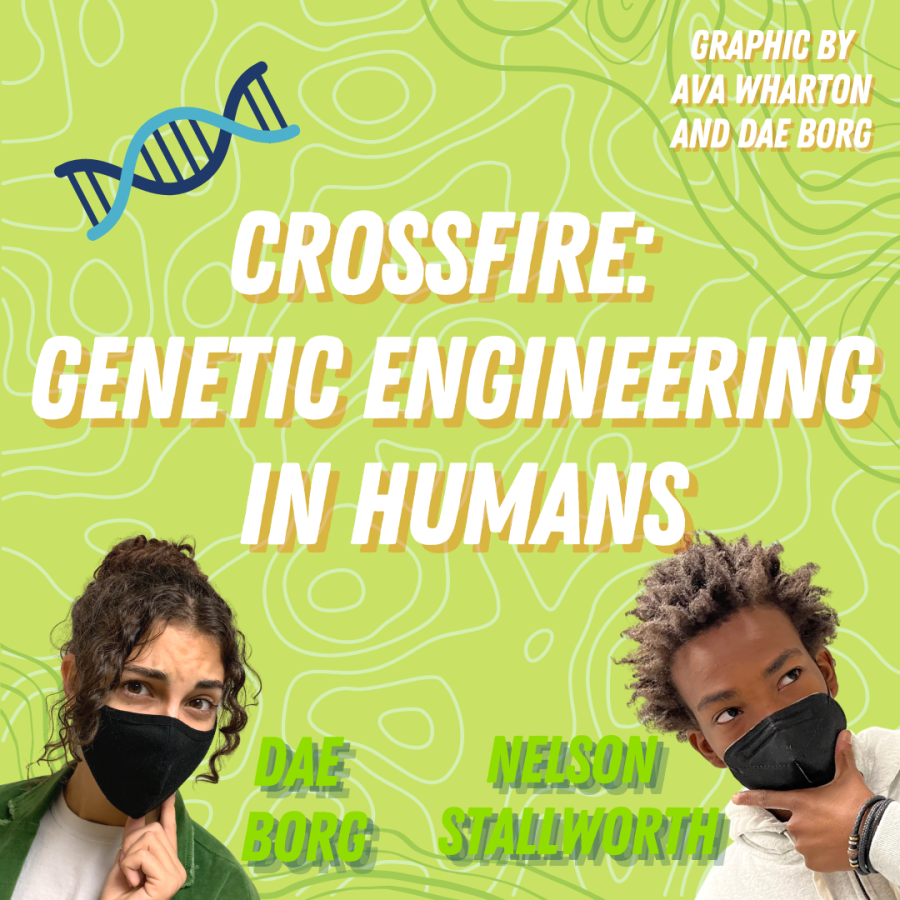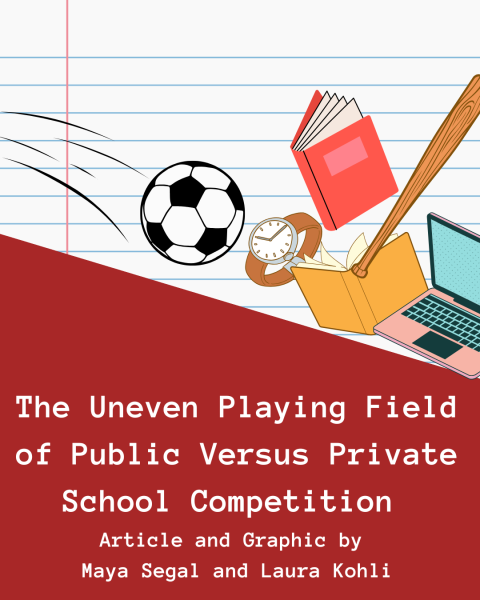Crossfire: Genetic Engineering in Humans
Science v Ethics: Genetic Engineering in Humans
by Dae Borg
“The ethics of science regards the search for truth as one of the highest duties of man.” – Edwin Grant Conklin, biologist
Today, science and technology are more advanced than they have ever been before, making the dreams of scientists a reality. These developments have the potential to make revolutionary breakthroughs in the world of science and help humanity immensely; however, science and technology do not always align with ethics and what is good for all humans. To be more specific, genetically modifying humans using the CRISPR gene-editing technology is not only risky, but could possibly divide our people even further and create even more unknown genetic disorders.
CRISPR-Cas9 is a powerful tool discovered in 2012 that has the ability to make specific changes in the genetic code of an organism. The RNA-guided protein Cas9 is able to locate a sequence of DNA in the genetic material that matches the sequence of the programmable sequence of its guide. With this technology, one can locate a sequence that codes for a specific hereditary disease, such as down syndrome, sickle-cell anemia, cystic fibrosis, etc., and remove it entirely from the DNA double helix, replacing it with new genetic information supplied by the experimenter. One of the primary arguments in favor of CRISPR-Cas9 is the elimination of these hereditary diseases, but a lot of the technology isn’t perfect yet, and problems could arise from experimenting with the genes of people. Mr. Carlson, an Enloe Biology teacher who is “completely against” genetic engineering in humans explained, “At different points in our lives, we end up expressing different genes in different ways at different times, and we don’t know the outcomes of what happens if that particular gene is shut off…we don’t know how it’s going to progress over the course of their lives when we just changed that balance of chemistry that’s occurring within people.”
Although it is amazing that we have the ability to identify and remove the genes responsible for these hereditary diseases, the implementation of this technology and the idea that we can “fix” people at the genetic level is a threat to those who are already judged in our society for being “biologically inferior.” Not only are scientists proposing that this technology would remove specific genetic diseases from society, but they are also suggesting that soon, humans will be able to pick out specific traits that they would want their children to have by genetically modifying the embryo before birth. This is cause for concern because it will create an even greater divide between people based on their appearance and abilities, and push people with genetic disorders further into the dark. Not only will we have people with and without disabilities but also super-humans, with enhanced strength, intelligence, immune systems, and so much more. Carlson added, “It’s one of my views of life that we grow because we overcome difficulties….So on one hand, I think there’s obvious health and prosperity type things that are intertwined with that, but if people don’t have to overcome whatever it is they have to overcome, then it’s not a reason for them to suffer in the first place. But human growth, I think, is when people come to adapt or figure things out at some point.” Moreover, technology like CRISPR isn’t free. Not everyone can afford to be able to select specific traits for their offspring and remove the chance of any hereditary diseases; this is a resource offered only to the rich.
So, with little knowledge of the impacts this technology can have on society, I think it’s safe to say that there needs to be a lot more discussion about the topic before we start really implementing it in our society. After speaking with Mr. Carlson about the differences between genetic modification in foods and genetic modification in humans, he warned, “Well, if we start genetically modifying people, how are their grandkids going to turn out? There’s just a lot of unknowns there. So if we screw up a corn batch, we screw up a corn batch. A company put a lot of money into a corn batch. They maybe lost their money. If we screw up a whole generation of kids, that’s a bit different.” It’s scary to think about the lasting impacts this once-dreamed-upon technology has on our society. Science is a truly wonderful thing, and it can make a revolutionary impact on humans and how we live, but when ethics get involved with technology, it’s better to be on the safe side. No child should be a science experiment.
The order of our society as a whole could be single-handedly dismantled by altering the natural state of our genomes, and I hope that there is a different solution to the problems proposed by gene-editing technology in the future. Nobody, especially people who have genetic abnormalities, should be pushed further into the depths of our society, but rather, be celebrated and lifted up by others.
Super Babies: Take ‘Em or Leave ‘Em
by Nelson Stallworth
Genetic engineering, or human germline engineering, is defined as “the process by which the genome of an individual is edited in such a way that the change is heritable.” In theory, a successful change would be achieved through altering genes within the reproductive cells of the parent organisms (egg and sperm.) As of today, the science isn’t all there, and there’s no proof of its safety; as such, we ought to abstain from genetically modifying humans for now. However, when the time comes that we do know more, and we’re sure that it is a medically safe practice, it’s guaranteed to change the world.
In the year 2020 alone, more than 1.8 million people were diagnosed with cancer. About 1 in 13 black babies are born with Sickle Cell Trait (SCT) and Sickle Cell Disease occurs in about 1 in every 365 black births. About 1 in every 10,000 Americans are born with some form of Huntington’s Disease (a condition where nerve cells in the brain progressively break down). About 1 in 30 Americans are carriers of cystic fibrosis genes, and the disease (which involves the fatal damaging of the lungs and digestive system) occurs in 1 for every 2,500 white newborns in the US alone. About 1 in every 700 Americans are affected by Down Syndrome. Those with a family history of Alzheimer’s are more likely to develop the disease than those without. 60% of the world’s population is affected by a disease with some sort of genetic background, according to the Australian Department of Health. That’s 4.2 billion lives cut short. 4.2 billion families compromised.
These tragedies could possibly be avoided with this technology. Scientists would be able to replace harmful or non-functioning genes; For example, the gene p53, linked with the prevention of tumor growth. Many types of cancer have been associated with a defective p53 gene. If scientists could replace the defective gene, it may trigger cancer cells to die. Another example is using vehicles called vectors (likely viruses), delivering new genetic information directly into cells to help treat the disease. With this technology, the impacts could be revolutionary. However, the practice does have its criticisms, even outside of the safety front.
If the technology for “designer babies” is fully developed, it would almost surely be a resource afforded solely to the rich upper echelon of society, transforming what were previously economic divisions into genetic and physical divisions as well. As the 1% are guaranteed to grow smarter and stronger, everyone else would be left to rely on plain old luck. Is this fair? Should these circumstances be allowed to come to pass? Is it right to hold one group back for the sake of another? Is the concept of natural selection applicable here, or would that be sick and inhumane? It’s hard to say, but it is not too difficult to foresee some kind of system established to prevent the concepts from Andrew Niccol’s Gattaca from becoming a reality. It’s plausible that there would be limits being placed on the practice to avoid that very thing, such as enforcing restrictions so that it can legally be performed only if there’s a genuine medical concern for the child, or having programs in place that make it possible for people less financially privileged to have access to the same thing. The point is, this isn’t an obstacle that’s impossible to clear. It’s significantly more perplexing than others and requires much care in how it’s addressed, but it’s not unsolvable.
Picture this: A world in which mental and physical diseases could be avoided, where deformities and the like could be stopped before they happen and people who would ordinarily be at a direct disadvantage at birth have a fairer experience in life. It sounds magical and purely fictional, but every day it comes closer to becoming a reality. Genetic engineering in humans is unsafe to proceed with today, but if one day it is, the benefits will far outweigh the negatives.
Your donation will support the student journalists of Enloe Magnet High School, allowing us to cover our annual website costs. We are extremely grateful for any contribution, big or small!

(She/her)
Dae Borg is a senior who has a love for the Earth, wildlife, the arts, and meeting new people. She enjoys writing about global environmental...

(He/him)
Nelson is a senior looking forward to another year as a part of the Eagle's Eye. When he's not hanging out with friends and family, he can...












Victoria Keyser • Nov 25, 2023 at 11:18 PM
I worry about this technology in the wrong hands! Great article though!